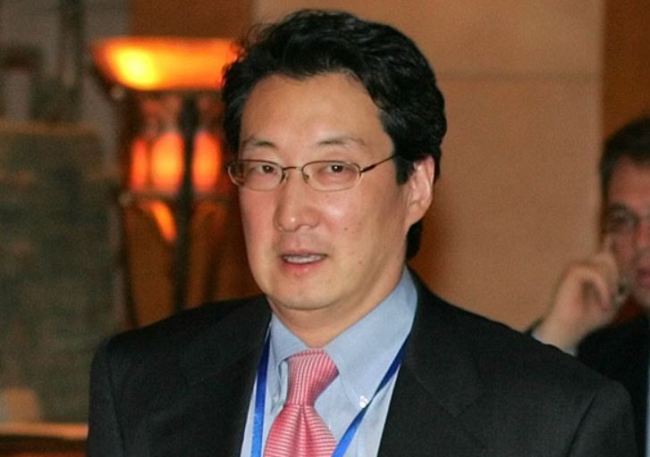WASHINGTON -- US President Donald Trump's withdrawal of his pick for ambassador to South Korea has fanned concerns that the administration is seriously considering a military strike on North Korea.
Victor Cha, who served on the White House National Security Council under George W. Bush, was dropped after reportedly voicing reservations about the Trump administration's consideration of a limited strike on nuclear and missile facilities in the North.
The news came amid a rare opening for reconciliation between the two Koreas. Inter-Korean dialogue has been under way since last month after North Korean leader Kim Jong-un expressed an interest in sending a delegation to the PyeongChang Winter Olympics, and Seoul has been eager to build on that momentum for peace.

Victor Cha (AP)
Trump has supported the inter-Korean talks, but his withdrawal of Cha appears to lend weight to the voices within his administration that advocate the use of force against North Korea's growing nuclear threat, according to analysts.
"I think if the White House dropped Victor Cha as its nominee for ambassador to South Korea this late in the game because he expressed concerns about a military strike approach to North Korea, then that's very worrisome," Frank Aum of the US Institute of Peace said in an interview with NPR Wednesday. "It suggests that the White House is giving this option serious consideration."
Robert Manning, a senior fellow at the Atlantic Council think tank in Washington, acknowledged there has been a debate within the administration, and "a troubling tendency by some to discount the effectiveness of deterrence."
North Korea has been deterred from renewing an attack since the end of the 1950-53 Korean War, according to proponents of that strategy. And last year's new international sanctions against the regime need time to fully disrupt the North Korean economy and hence its weapons development, Manning said.
Some argue that a limited strike won't escalate into full-blown war because Kim is rational and will not risk the survival of his regime.
"How do you convince North Korea that we are only going for a limited, 'bloody nose' strike rather than trying to deliver a full knockout punch against the regime?" Aum said. "So if the US strikes, then North Korea will have to respond to maintain its credibility and deterrence. And this means significant risks, huge human and economic casualties not only in Seoul but potentially in Japan and the United States as well."
The US will have to weigh the risks associated with each option, according to Bruce Bennett, a senior defense analyst at RAND Corp.
"The key question is how much risk and what form of risk should the US take to prevent the region and the world from being seriously destabilized by a growing North Korean nuclear weapon threat that the North will almost certainly use (indeed, is already using) for coercion, probably use for proliferation, and maybe use for warfighting," he said.
What's clear, according to some, is that tensions will rise again after the Paralympics in March.
"As sure as day follows night, after the Olympics tensions will be renewed: the US and (South Korea) will resume military exercises and Kim will likely test an intercontinental ballistic missile -- he has to keep testing, because that's the only way to find out what is wrong and fix it," Manning said. (Yonhap)





![[KH Explains] No more 'Michael' at Kakao Games](http://res.heraldm.com/phpwas/restmb_idxmake.php?idx=645&simg=/content/image/2024/04/28/20240428050183_0.jpg&u=20240428180321)
